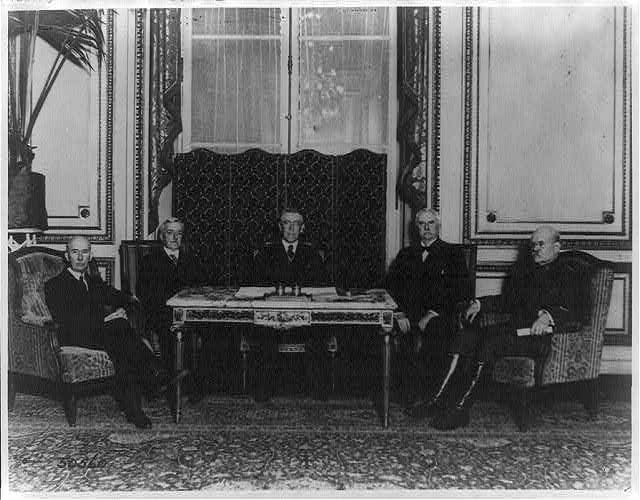
“I can predict with absolute certainty that within another generation there will be another world war if the nations of the world do not concert the method by which to prevent it.”
Once Wilson knew that the U.S. would be unable to avoid entering the war, he worked to find a way to stop such a war from happening again. In January 1918 he announced the 14 Points, a set of principles designed to remove the causes of another great war. The 14 Points included an international organization to keep the peace, by providing a place where disputes could be discussed and mediated. The 14 Points inspired the peoples of the Allied Nations and gave them hope that another great war could be prevented. When Wilson traveled to Europe in late 1918 to attend the Paris Peace Conference, he was met by crowds numbering in the millions in Britain, France and Italy.
At the Peace Conference in 1919, Wilson moved the seat of the presidency to Paris for six months while he commanded the attention of the world. He was faced with the leaders of the Allied Nations determined to win as many concessions and as much territory as they could for their countries. Wilson argued and fought with them through June of 1918 to make as fair a treaty as possible under the circumstances. Wilson drew up terms of peace including his design for a League of Nations, a world body to settle future conflicts among nations.
Wilson took direct personal control of American foreign policy, which he believed was constitutionally mandated. He personally attended meetings and negotiations and penned his approval of the Terms of Peace and the Covenant of the League of Nations. But, Wilson's biggest fight was yet to come. Back in the United States, the Senate had reservations over the League, reservations that still echo today about the U.S. losing sovereignty and becoming the "policeman of the globe." They failed to ratify the treaty, despite two attempts and a cross-country trip by the president to bring his message directly before the American people. It was during this trip that Wilson fell ill, and soon after returning home he suffered a devastating stroke which left him politically and physically weakened. In mind and spirit he was still the President of the United States and he continued to govern from his sickbed with the assistance of his closest associates and Mrs. Wilson.
The League of Nations, and although the U.S. was never a member, its creation earned Wilson the Nobel Peace Prize. Wilson sacrificed his health trying to win U.S. entrance into the League, but he never lost faith that his country would one day join in a world community for peace.
The Woodrow Wilson House, a site of the National Trust for Historic Preservation, opened to the public as a museum in 1963. We take our responsibilities seriously as stewards of this House. We share Wilson's legacy, a legacy that includes WWl, the League of Nations, and visions of world peace as well as policies that institutionalized racism, segregation and loss and obstruction of civil liberties. As historians, preservationists and educators we are determined to share the truth of history, even when it is not complimentary to its subjects. An honest appraisal of history helps us understand ourselves as a nation and as a people.
The Woodrow Wilson House is regularly open to the public for guided tours, serves school and other group tours, is available for public meetings, corporate events, and weddings, presents exhibitions in its gallery, and offers educational programming.
We hope you will join us, visit us, support our mission by donating or volunteering, or sign-up for our newsletter to stay updated. Please contact us with any questions.
